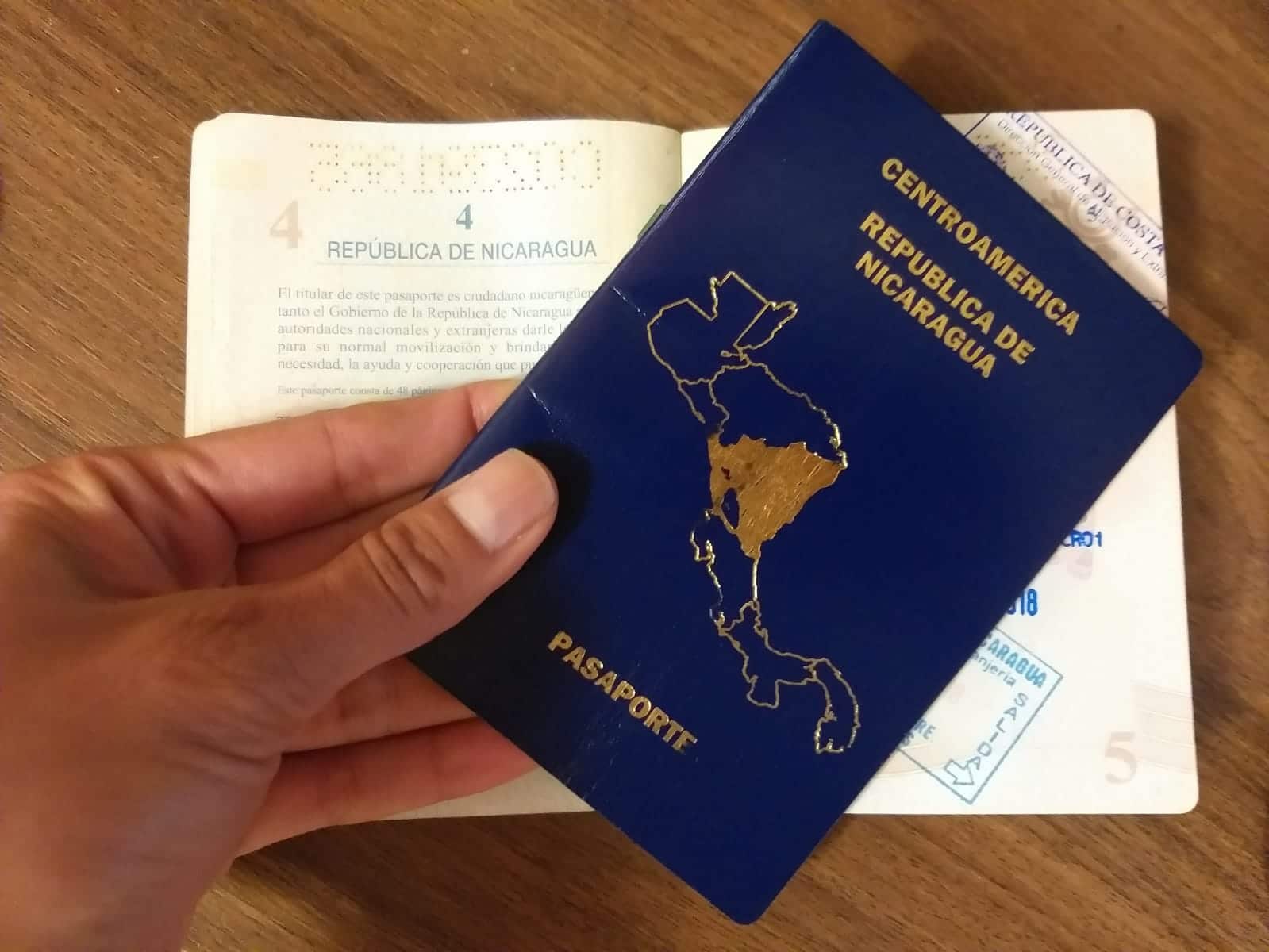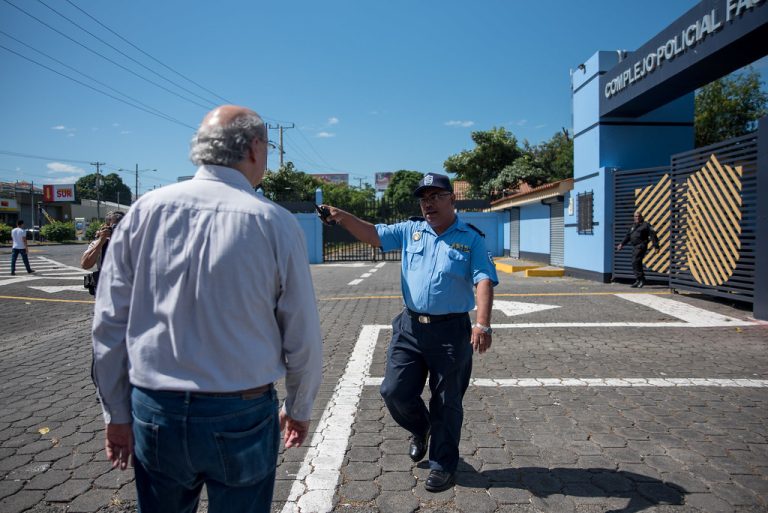6 de diciembre 2021

Nicaragua: Public Employees Hindered from Traveling to USA

PUBLICIDAD 1M
PUBLICIDAD 4D
PUBLICIDAD 5D
We must keep the crisis of tyranny on the radar of international public opinion, and not accept the normalization of the police state

We must keep the crisis of tyranny on the radar of international public opinion
Until April 18, 2018, the family dictatorship that had concentrated all state powers in Nicaragua since 2007 had ruled for almost a decade with an economic and political alliance with big business, without democracy or transparency. There was never freedom of the press or access to public information, but without a political opposition and social counterweight, the regime maintained a certain tolerance that allowed the existence of an independent and critical press, under restrictions and reprisals. For example, the investigative journalism of CONFIDENCIAL investigated and denounced corruption with evidence, but without consequences for the regime, while Daniel Ortega maintained a siege of pressure and espionage on the media and used his family emporium and private media to lynch the independent press.
All this changed radically when Ortega and Murillo lost the political majority in the streets during the social outburst of 2018, and their alliances collapsed. The family dictatorship became a bloody dictatorship, and repressed the citizens and journalists with equal virulence, while civil society organizations and the media became the “enemy” to be crushed. The repression left more than 328 people dead, thousands wounded, hundreds imprisoned, tens of thousands in exile, and the imposition of a de facto police state. After the great electoral fraud of November 7, 2021, the regime intends to enthrone itself as a totalitarian dictatorship that represents a serious threat to Central and Latin America.
Unlike other more prolonged crises, such as that of Venezuela, in Nicaragua, all crimes against freedom of the press have been concentrated with marked intensity in three and a half years.
As a result, journalism in Nicaragua is now done under the risk of physical aggression, assault, the harassment of police and paramilitaries, the threat of jail, for both journalists and sources of information or opinion.
Despite censorship, we journalists continue to report and do journalism in Nicaragua and from exile on digital platforms, although we are obliged to protect the identity of independent sources that we cannot cite, because under a totalitarian regime reporting and expressing an opinion is a “crime” that is punishable by imprisonment.
For three years, the resistance of the press has rested on the courage of the reporters and their professional, ethical and political commitment, with their attachment to the truth at any cost and their refusal to accept censorship or self-censorship.
Our first task was to call the victims of the repression by name and tell the stories of those killed, who to this day continue to be denied and hidden by the State. Thus arose a close collaboration between independent journalism and human rights organizations, and the Mothers of April, the movement of victims’ families who demand truth and justice without impunity.
Indeed, we journalists took a stand alongside the victims of the massacre to promote an agenda of truth, memory, justice, and non-repetition, as an ethical compromise with the democratic reconstruction of the country.
We take a stand, demanding the unconditional release of the more than 160 political prisoners, and the annulment of the spurious trials. We demand an end to the regime of torture to which the leaders of the Unamos movement (former Movimiento Renovador Sandinista), Dora María Téllez, Tamara Dávila, Suyén Barahona and Ana Margarita Vijil are being subjected. Today, they have spent 173 days in the solitary confinement cells in El Chipote prison.
During the rebellion of April 2018, the freedom of expression of citizens was twinned with the freedom of the press of journalists to disseminate news and reliable information. The empowerment of the people in the protests and the massive use of cell phones and social media generated a torrent of information without which it would not have been possible to cover the civic insurrection in its national dimension. We journalists and independent media continue to perform, primarily, a professional curatorial work to verify and contextualize images and information from social networks.
In practice, we carry out collaborative journalism that arises from the need for self-protection of reporters in street coverage through collective action in the face of police and paramilitary siege and aggression, and the imperative to distribute on digital platforms the contents of media that are censored. In addition, we share sources, and even news scoops, and carry out joint investigations to achieve greater depth and dissemination of information, to win the battle for truth.
In the midst of the climate of threats and extreme political polarization, the press has not stopped doing quality investigative and narrative journalism. The journalistic investigations on extrajudicial executions, human rights violations, the corruption of the regime, and the over mortality during the covid-19 pandemic, awarded in international competitions, offer an irrefutable sample of the quality of journalism and resistance.
With the rule of law demolished and civil society persecuted, never in the history of Nicaragua has the press been more unprotected against authoritarian power, against which the only means of protection for the press is to do more and better journalism. A journalism of resistance, which must also be journalism of quality, because the only thing that defends us against totalitarianism and official slander is credibility in the eyes of our audiences.
Nicaraguan journalism has reinvented itself in exile - mainly in Costa Rica, the United States and Spain - through digital platforms, but our eyes and ears, all our senses, are in Nicaragua, with colleagues and citizens who remain in the country facing the highest risks to inform. We therefore appeal to the international press to keep the Nicaraguan crisis at the forefront of public opinion worldwide and particularly in Latin America.
Human rights and press organizations - the OAS Special Rapporteur for Freedom of Expression; the IACHR and the Office of the United Nations High Commissioner for Human Rights; Human Rights Watch; Amnesty International; the Inter American Press Association; the Committee to Protect Journalists; Reporters Without Borders; Free Press Unlimited; Article 19; among others, have done an extraordinary job in making the persecution of journalists visible and demanding their protection. But many more stories about the tragedy of Nicaragua under a police state are needed in the international press.
The November 7 elections, the results of which were known in advance, generated unusual interest in the international press, which was also unable to travel to Nicaragua because the regime imposed border restrictions. To many international media colleagues who interviewed me during those days, I reiterated that the real story is not what would happen on November 7 - a single-party vote without political competition - but the day after. That is, in the coming months and perhaps years, in the process of civil resistance to get out of a dictatorship without legitimacy through civic struggle.
In the meantime, we cannot accept the enthronement of a totalitarian dictatorship in Central America through the normalization of violence and the police state. The greatest challenge facing Nicaragua's journalists and the international press today is to keep the crisis of Daniel Ortega's tyranny on the radar of global public opinion, and particularly in the Americas. The story of the day after the electoral farce is to tell how a repressive dictatorship is changed by civilian means. That is the news that is being written today about the days of pain and hope that Nicaragua is experiencing.
Fragment of my statement during the Latin American Conference of Investigative Journalism, COLPIN, Canelones, Uruguay, December 1, 2021.
This article was originally published in Spanish in Confidencial and translated by our staff
Archivado como:
PUBLICIDAD 3M
Periodista nicaragüense, exiliado en Costa Rica. Fundador y director de Confidencial y Esta Semana. Miembro del Consejo Rector de la Fundación Gabo. Ha sido Knight Fellow en la Universidad de Stanford (1997-1998) y profesor visitante en la Maestría de Periodismo de la Universidad de Berkeley, California (1998-1999). En mayo 2009, obtuvo el Premio a la Libertad de Expresión en Iberoamérica, de Casa América Cataluña (España). En octubre de 2010 recibió el Premio Maria Moors Cabot de la Escuela de Periodismo de la Universidad de Columbia en Nueva York. En 2021 obtuvo el Premio Ortega y Gasset por su trayectoria periodística.
PUBLICIDAD 3D